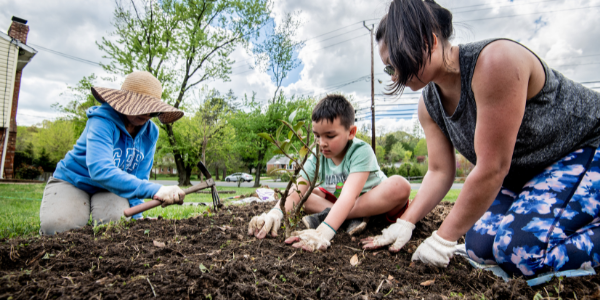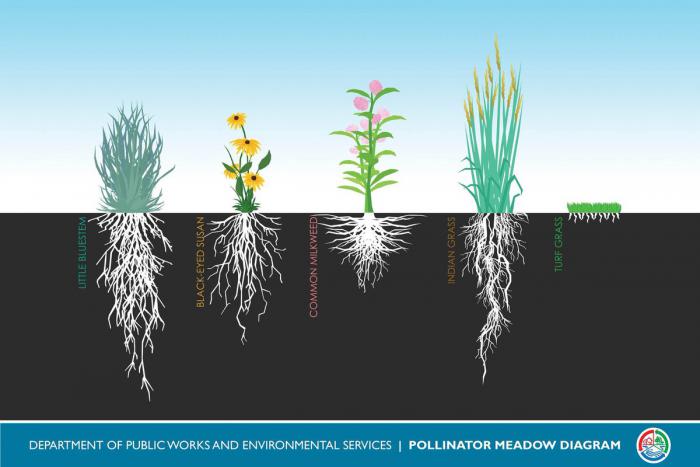
With temperatures rising and spring bulbs poking through the earth, we offer these tips/services to get your lawn and garden ready for spring.
#1: Need Advice? Contact a Master Gardener
For more than 40 years, the Fairfax County Master Gardeners Association has served as the area’s experts in helping local gardeners with a host of horticultural conundrums — from selecting the right plants and understanding how to care for them, to conducting home soil tests and helping address pest issues.
During the growing season, master gardeners are on duty five mornings a week, Monday through Friday, from 9 a.m. to noon.
- Phone: 703-324-8556
- Email: HelpDesk@FairfaxGardening.org
Do you need advice in person?
- Attend plant clinics
- Explore upcoming classes at library branches
Want to learn more about gardening? Search "gardening" on the Park Authority's activities page to sign up for gardening classes.
#2: Plant Native
Native plants have many benefits, ranging from supporting wildlife to needing little maintenance. Native species will tolerate the environment of our region: the soil, temperature and rainfall, and they have the added bonus of attracting local birds and butterflies.
By planting native species, you will:
- Reduce erosion and runoff
- Reduce the spread of non-native species
- Maintain the integrity of local habitats
- Maintain or improve soil fertility
- Help sequester carbon
- Increase birds and other wildlife
- Plant deep-rooted options, as the graphic shows below (versus the roots of grass)

Native trees are also essential to our local ecosystem. Learn more about Plant NOVA Native Trees, a campaign to encourage all of us to plant more beneficial trees.
#3: Lawn Fertilizer and Soil Test Tips
If you think you need to fertilize your lawn, think again! Don’t fertilize in the spring if you have cool-season grass, like tall fescue, Kentucky bluegrass and perennial ryegrass. Most grasses in Northern Virginia are cool-season grasses. Feeding your lawn at the wrong time of year can actually hurt your grass in the long run.
When it rains, excess fertilizer runoff also harms the health of our creeks, streams and the Chesapeake Bay.
A soil test is the best tool available for determining if fertilizer is actually needed. Learn how to get your soil tested at Virginia Tech’s Soil Testing Laboratory from the Northern Virginia Soil and Water Conservation District.
#4: Shop Locally and Plant Swap
Whether you're planning a colorful flower patch or a bountiful backyard veggie garden, these nature centers and nurseries in Fairfax County have you covered. Find seeds, specialty plants, flowers, herbs, veggies, planters and everything in between. Check out this list from Visit Fairfax.
Many library branches also regularly host plant swaps where community members are encouraged to bring their own seeds, seedlings and clipping to exchange with other gardeners.
#5: Get Free Mulch
Applying a layer of mulch in spring will help maintain soil moisture and control weeds. Mulching also insulates soils keeping them warmer in winter and cooler in summer.
We produce good quality, double-shredded wood mulch for residents for free. Mulch is usually available at the I-95 and I-66 transfer stations.
Note: Despite the appeal of those attractive mulch mountains, don’t pile mulch against tree trunks or plant stems. It can stress plants causing insect and disease problems.
#6: Recognize and Report Invasive Species
Keep an eye out for invasive species that can lead to the extinction of native plants and animals, reduce biodiversity, and permanently change habitats. Invasive species include plants, animals and insects, and diseases. Learn how to recognize the different invasive species. Early detection of invasive species and reporting to the appropriate organization is important to controlling the spread.
#7: Go Green By Composting Food and Recycling Water
Composting is nature’s way of recycling. And it has evolved a lot in the last few years, including new food compost drop off spots at our I-66 and I-95 transfer stations, as well as at select farmers markets.
Whether you decide to compost at home, contract for curbside collection, or take your organic matter elsewhere, you will be doing your part to help recycle natural matter and reduce methane emissions.
Recycle rainwater with rain barrels. Rain barrels provide a great way to collect, store and use rainwater at home. By installing a rain barrel, you can save money and water. Attend a build-your-own barrel workshop, hosted by the Northern Virginia Soil and Water Conservation District.
#8: Spring Cleaning
Do you have insecticides, weed killers or other household hazardous waste you want to get rid of safely? We’ll take those corrosive, ignitable, toxic and reactive materials items for free at our I-66 and I-95 recycling locations.
Learn what’s accepted and not accepted, what’s OK to drain and what’s OK to trash.
Spring cleaning also may include clearing litter! Learn about litter in our community, how you can help and who you can request free clean up supplies from.
#9: Help Migrating Birds This Spring by Turning Off Unnecessary Lights
As birds begin their migration this spring, the county is supporting the "Lights Out for Birds" campaign led by the Northern Virginia Bird Alliance. The alliance, in partnership with local organizations such as Nature Forward, Friends of Huntley Meadows and DarkSky NOVA, encourages residents and businesses to reduce excessive outdoor nighttime lighting from 11 p.m. through 6 a.m., March 15 to May 31 — the peak of spring bird migration.
#10: Join the Sustain Fairfax Challenge and Track Your Climate Action
We're encouraging you to take climate action using a new climate engagement platform. Sign up now to start reducing your environmental impact through progress tracking, daily reminders, and collaboration with friends, family and colleagues
#11: Prevent Tick Bites
As you're gardening and enjoying the outdoors, ticks are ever present depending on conditions. There are three tick species regularly found in Fairfax County that can transmit disease to humans. Make simple changes to your yard's landscaping to keep ticks away. Learn eight ways to prevent tick bites.
#12: Events: Farmers Markets, Cherry Blossoms, Earth Day and More
By providing access to locally grown foods, our 10 farmers markets strive to improve the health of residents, support local food producers and protect the environment. Markets open on a rolling schedule in April. Of course, fresh vegetables, fruits and other goods are available for purchase, as are vegetable plants for your own garden.
Stroll through local gardens to inspire ideas for your own garden. Visit Fairfax compiled a list of four spectacular gardens to visit in the county.
If you don’t have space for a garden but want to enjoy the beautiful offerings of spring, attend the National Cherry Blossom Festival.
Enjoy the spring weather and celebrate Earth Day Fairfax festival on April 26. You’ll have a fun day packed with entertainment, activities, food vendors, Touch-A-Truck, prizes, and more. Learn More About Earth Day Fairfax.



 SIGN UP FOR DAILY EMAIL HEADLINES
SIGN UP FOR DAILY EMAIL HEADLINES